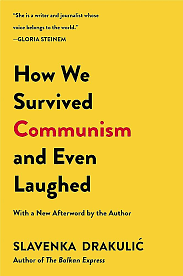You need to sign in or sign up before continuing.
Take a photo of a barcode or cover
Drakulić gives the reader so much to think about in her memoir and socio-cultural critic of living in Eastern Europe under Communist rule. The book was written in 1991, and has been translated into more than 10 languages. It looks like this is the first time it has been made into an audiobook.
While the book is nearly 30 years old, initially written in 1991, Drakulić addresses living in poverty and doing without (or making do), the Communist bureaucracy and rule, the role of women during this time and place. What I found so fascinating about her story is how much is still relevant today, and how much Americans (especially Americans living in pandemic and post-pandemic society) have to learn. She talks about empty shelves in the stores, the luxury of toilet paper, and the necessity of re-using everything; as well as the desire to want and imitate the fashion of American or Western European women (at least what they thought was their fashion).
Lockford does an incredible job of giving Drakulić a voice and narrating the book. It is a relatively quick listen at 6 hours and 3 minutes.
Thank you to Libro.Fm and Dreamscape Media for the ALC of this audiobook.
While the book is nearly 30 years old, initially written in 1991, Drakulić addresses living in poverty and doing without (or making do), the Communist bureaucracy and rule, the role of women during this time and place. What I found so fascinating about her story is how much is still relevant today, and how much Americans (especially Americans living in pandemic and post-pandemic society) have to learn. She talks about empty shelves in the stores, the luxury of toilet paper, and the necessity of re-using everything; as well as the desire to want and imitate the fashion of American or Western European women (at least what they thought was their fashion).
Lockford does an incredible job of giving Drakulić a voice and narrating the book. It is a relatively quick listen at 6 hours and 3 minutes.
Thank you to Libro.Fm and Dreamscape Media for the ALC of this audiobook.
adventurous
challenging
dark
emotional
informative
medium-paced
challenging
emotional
informative
reflective
slow-paced
challenging
sad
slow-paced
informative
reflective
medium-paced
reflective
fast-paced
I was quite impressed by Slavenka Drakulić’s [b:S.: A Novel about the Balkans|278232|S. A Novel about the Balkans|Slavenka Drakulić|https://i.gr-assets.com/images/S/compressed.photo.goodreads.com/books/1490376751l/278232._SY75_.jpg|1605415], and jumped at the chance to read her 1991 nonfiction How We Survived Communism and Even Laughed. I was very curious to see how she describes the “wonders” of the Socialist block, written at the time when that world just shattered, seen through the prism of “banal”, “women’s” things — makeup, dolls, clothes, housework, food deficits. All those things that the world supposedly built to reach the wonderful ideal left behind, to be dealt with at some later point. All those things that the state considered inessential and trivial - washers, dryers, tampons, makeup - was traditionally considered women’s sphere of life and tended to contribute to women’s work which was not something the state aimed at reducing.
But it left me a bit cold — but through a fault not its own but rather because its power is in shocking the reader with the shortages of the Socialist Block, and those I already knew.
Maybe it is because I am not the perfect target audience for this book that bemoans the rations and poverty of the Socialist Block as compared to the capitalist world. You see, I was not comparing it to that glossy shiny world of consumerism that - of course, for those with means - could give you Vogue and Barbies and modern washing machines and stores full of food open late into the night and soft toilet paper, but rather to the one further East, in the Soviet Union itself. The “communism” as Drakulić describes it, the Eastern block version, was still quite a paradise compared to the true thing happening behind the borders of the USSR. The supposedly gloomy life with shortages and rationing and censorship — that was still pretty enviable to those in the actual Soviet paradise, still was years ahead. East Germany or Yugoslavia weren’t Belarus or Ukraine.
This book focuses on poverty and deprivation (when compared to the capitalist society for those with the means, yes). It recalls the longing for pretty things and conveniences, especially by women on whose shoulders all the manual housework labor fell — and yes, there is quite a bit of longing for consumerism that wasn’t available to them.
In the world of excesses it’s easy to be repulsed by rampant consumerism, and it’s trendy to show ecological consciousness, recycling and attempts at scaling down. But in the world of deficits consumerism seems to be a shining beacon in the darkness. And before scoffing at the desire for consumerism and easy access to goods, think this — would you want to spend the rest of your life with Soviet Block toilet paper?
And yet every time she went into the frustrated accounts of deprivation, often based on the overall deficit, systemic rather than individual poverty, I was taken out of the narrative by thinking — hey, this was not as bad as what I have heard (and even known), and the desired level of horrified compassion was getting diluted.
And Drakulić’s anecdotes kept reminding me that she came out of a different world than I was thinking about, even when she had to learn “what every child under communism had to learn, that you can’t find everything you need all the time and most likely can’t ever find anything.” Her mother was able to travel to Italy and buy a coveted silk nightdress there. She remembers her grandmother doing laundry by hand without washer and dryer, but her family by the 70s had a washing machine (although she does acknowledge that some did laundry by hand even in the 90s).
So how about that — this book is great for those who likely haven’t experienced firsthand or through family stories the “wonders” of the socialist block, and a good eye-opener for those who, through the safety of geography and means, start idealizing that world.
For the rest of us it’s okay, lacking the punch that unfamiliarity brings. Although Drakulić is an engaging writer, which makes up for that somewhat, and her feminist angle was actually really good. And that powerful chapter on the beginning of the Yugoslav wars was heartbreaking — the world starting to fall apart just as normality seemed within reach.
Now what I want to read is Drakulić’s later book on life after the Socialist Block has been fully dissolved - [b:Café Europa Revisited: How to Survive Post-Communism|53230639|Café Europa Revisited How to Survive Post-Communism|Slavenka Drakulić|https://i.gr-assets.com/images/S/compressed.photo.goodreads.com/books/1603738910l/53230639._SY75_.jpg|80566701]. I think that one will strike a stronger note.
3.5 stars.
——————
Also posted on my blog.
But it left me a bit cold — but through a fault not its own but rather because its power is in shocking the reader with the shortages of the Socialist Block, and those I already knew.
Maybe it is because I am not the perfect target audience for this book that bemoans the rations and poverty of the Socialist Block as compared to the capitalist world. You see, I was not comparing it to that glossy shiny world of consumerism that - of course, for those with means - could give you Vogue and Barbies and modern washing machines and stores full of food open late into the night and soft toilet paper, but rather to the one further East, in the Soviet Union itself. The “communism” as Drakulić describes it, the Eastern block version, was still quite a paradise compared to the true thing happening behind the borders of the USSR. The supposedly gloomy life with shortages and rationing and censorship — that was still pretty enviable to those in the actual Soviet paradise, still was years ahead. East Germany or Yugoslavia weren’t Belarus or Ukraine.
This book focuses on poverty and deprivation (when compared to the capitalist society for those with the means, yes). It recalls the longing for pretty things and conveniences, especially by women on whose shoulders all the manual housework labor fell — and yes, there is quite a bit of longing for consumerism that wasn’t available to them.
In the world of excesses it’s easy to be repulsed by rampant consumerism, and it’s trendy to show ecological consciousness, recycling and attempts at scaling down. But in the world of deficits consumerism seems to be a shining beacon in the darkness. And before scoffing at the desire for consumerism and easy access to goods, think this — would you want to spend the rest of your life with Soviet Block toilet paper?
“This was how the Communists lost. When the first free elections came in May 1990, the entire younger generation voted against “Golub”, against shortages, deprivation, double standards and false promises. In the whole of Eastern Europe they didn’t vote so much for the Democrats or Christians or Liberals or whatever the winning parties are called as against the Communists. But democracy doesn’t grant you toilet paper, rough or soft. In fact it doesn’t grant you any paper at all, at least in this part of the world.”
And yet every time she went into the frustrated accounts of deprivation, often based on the overall deficit, systemic rather than individual poverty, I was taken out of the narrative by thinking — hey, this was not as bad as what I have heard (and even known), and the desired level of horrified compassion was getting diluted.
And Drakulić’s anecdotes kept reminding me that she came out of a different world than I was thinking about, even when she had to learn “what every child under communism had to learn, that you can’t find everything you need all the time and most likely can’t ever find anything.” Her mother was able to travel to Italy and buy a coveted silk nightdress there. She remembers her grandmother doing laundry by hand without washer and dryer, but her family by the 70s had a washing machine (although she does acknowledge that some did laundry by hand even in the 90s).
But yes, there is sad pathos of recycling because you have to, using newspapers in lieu of absent toilet paper, the lack of tampons or pads (use rags instead), cloth diapers that had to be hand-washed out of necessity and lack of alternatives, and that horrendous ubiquitous blue eyeshadow.
So how about that — this book is great for those who likely haven’t experienced firsthand or through family stories the “wonders” of the socialist block, and a good eye-opener for those who, through the safety of geography and means, start idealizing that world.
For the rest of us it’s okay, lacking the punch that unfamiliarity brings. Although Drakulić is an engaging writer, which makes up for that somewhat, and her feminist angle was actually really good. And that powerful chapter on the beginning of the Yugoslav wars was heartbreaking — the world starting to fall apart just as normality seemed within reach.
Now what I want to read is Drakulić’s later book on life after the Socialist Block has been fully dissolved - [b:Café Europa Revisited: How to Survive Post-Communism|53230639|Café Europa Revisited How to Survive Post-Communism|Slavenka Drakulić|https://i.gr-assets.com/images/S/compressed.photo.goodreads.com/books/1603738910l/53230639._SY75_.jpg|80566701]. I think that one will strike a stronger note.
“This is what the Iron Curtain is made of: many facets of a different reality, of different ideals and meanings we were brought up with and truly believed in. […] The Iron Curtains will stay with us for a long time; in our memories, in our lives that we cannot renounce no matter how difficult they were and how hard we try.”
3.5 stars.
——————
Also posted on my blog.
hopeful
inspiring
reflective
medium-paced
reflective
medium-paced







